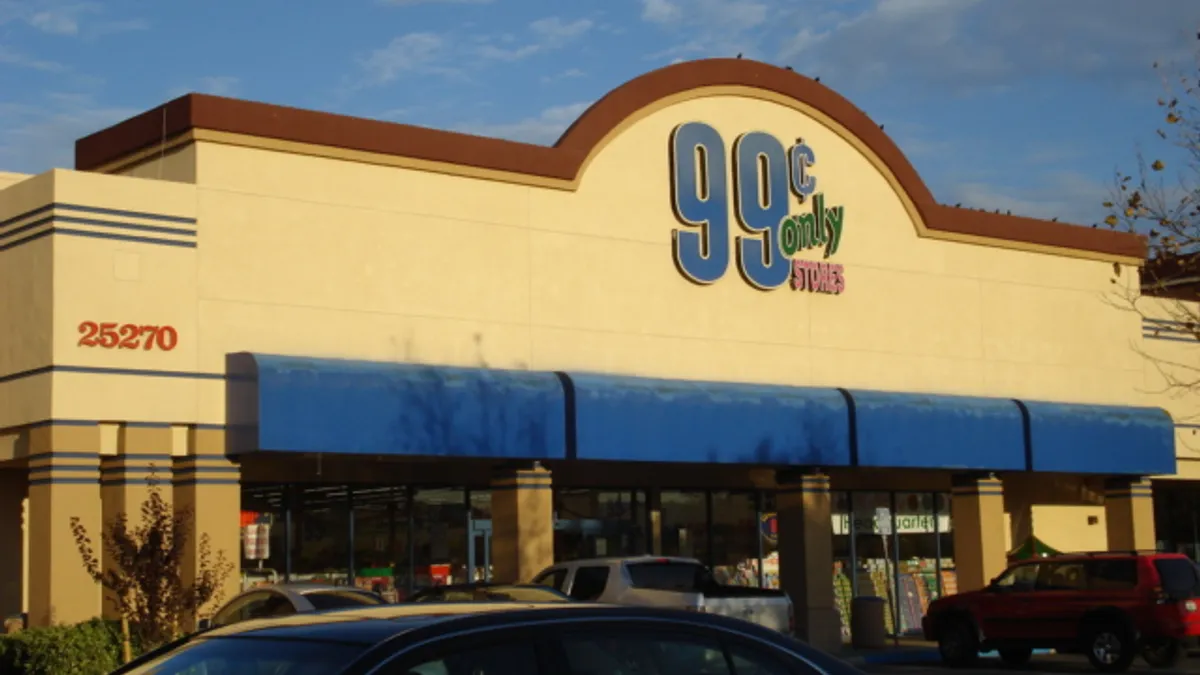Dive Brief:
- Deep discounter 99 Cents Only reached a deal with creditors and its private equity owners to trade out debt for equity in the company, according to a press release from ratings firm S&P Global emailed to Retail Dive.
- Viewing the deal as a form of default once complete, S&P issued an automatic downgrade of the retailer's credit rating, to CC from CCC+. (The company did not immediately respond to request for comment.)
- Under the agreement, 99 Cents Only is to issue common and preferred stock in return for its outstanding $146 million second-lien term loan facility and $143 million secured notes.
Dive Insight:
99 Cents Only has made two debt deals in as many years as the retailer tries to keep its balance sheet intact and tries to hold its own against the dollar store giants.
In late 2017, when it publicly reported earnings, the discounter posted losses even with top-line and comp sales growth in the double digits, after posting positive comps for several periods going. The retailer was projecting strong sales improvements last February when it named a new CEO. Yet since 2017, the company — owned by Ares Management and Canada Pension Plan Investment Board — has, at times, carried a relatively high risk of filing for bankruptcy, according to data from CreditRiskMonitor.
S&P analysts said in December 2017, when it completed a previous exchange that traded for new debt, the deal would improve 99 Cents Only's liquidity "somewhat." Apparently it wasn't enough to negate the need for another deal.
Debt swaps and other maneuvers are meant to keep companies out of bankruptcy court. Several retailers (often, like 99 Cents Only, carrying high debt loads leftover from private equity buyouts) have cut similar deals in recent years, among them J. Crew, Neiman Marcus and Charlotte Russe. If creditors buy in, such deals can buy time for a retailer to turn its performance around by relieving its debt obligations and preserving some liquidity.
But, as Charlotte Russe's case shows, the relief can be merely temporary. The fashion retailer still ended up in Chapter 11, where it liquidated its operations. (After buying Charlotte Russe's intellectual property out of bankruptcy, a fashion house recently opened new stores under the brand.) J. Crew, which inked a legally contentious debt swap in 2017, reportedly went back to creditors to discuss another debt deal.
99 Cents Only has the advantage of operating in a growing sector. Its peer, Dollar General, is one of the relative few success stories in the recent history of leveraged buyouts in the industry. The dollar giant was acquired for nearly $7 billion and taken private by KKR in 2007, as the economy headed into recession and consumers traded down. Dollar General went back onto the public markets a couple years later after new management shed unprofitable stores and grew the company.
Today, Dollar General is an ever-expanding force even Walmart has to reckon with, and one reason why the smaller, more regional 99 Cents Only has been struggling to catch up with its debt load.














